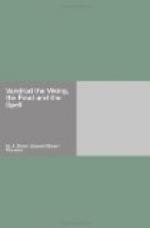While he spoke Osla’s gaze was fixed on the turning tide, but her eyes, had he seen them, were lit by the fire of his words. She sprang to her feet as he finished, and said,—
“I, too, have the Norse blood in me; the sea calls me as it calls you; and if I were a man, I fear I should make a bad hermit. Yet"- -and she held up a warning finger to stay the impetuous words on Estein’s tongue—“yet I know I should be wrong. What is this feeling but the hunger of wolves, and what are your gods but names for it? Wolves, too, go out to slay; and if they had speech, doubtless they would say that Thor called them.”
“Is a Viking not different from a wolf, then, in your eyes?”
“By too little,” she answered, “if they hold the same creed.”
“A wolf, then, I am,” he replied; “and I can but try to keep my lips drawn over my fangs and bit on my hind legs, and practise manliness as best I may.”
“A very hungry manliness,” she retorted. But despite herself she smiled, and then lightly turned the talk to other things.
From day to day the quiet island life went on with few incidents and pleasant monotony. With only one family was there any intercourse, and that almost entirely on Osla’s part. On the shore of the great island to the west, which men called Hrossey, dwelt a large farmer, named Margad, and from his household such supplies as they needed were obtained. He was an honest, peaceable man, as the times went, with a kindly wife, Gudrun by name, and they both took a friendly interest in the hermit’s daughter. Estein would fain have lived in her society all day, listening to her talk and watching the wind play with her hair, and every day he noticed, with a sense of growing disappointment, that he saw her more seldom. Sometimes they would have long talks, and then, abruptly as it seemed to him, she would have to leave him, and he would spend his time in fishing from a boat, or would cross with her to Hrossey, and while she went to see Dame Gudrun he pursued the roe-deer and moor-fowl.
With bow and arrow, and by dint of long and arduous stalks, he brought home scanty but well-earned spoil, and then, either by himself, or more often with Osla in the stern, he would cross the sound as the day faded, to a welcome supper and an evening spent in the firelit cell, or to a peaceful night beside the swirl of the tideway under a sky so pale and clear that only the brightest stars were ever seen.
He knew that he was in love, hopelessly in love. Why else should he stay in the Holy Isle after his wounds were healed, and when nothing bade him remain? Far away and faint sounded the echoes of war and the shouts of revelry. Like memories of another life, thoughts of his father, of Helgi, of friends and kinsmen, came to him, pricked him for a moment, and faded into a pair of dark-blue eyes and a tall and slender figure. He still talked to Osla of voyages and battles, and caught her sometimes taking more interest than she would own in some old tale of derring-do, or a story of his own adventures. Yet the actual memories of these things grew fainter, and he talked like an old man telling of his youth.




